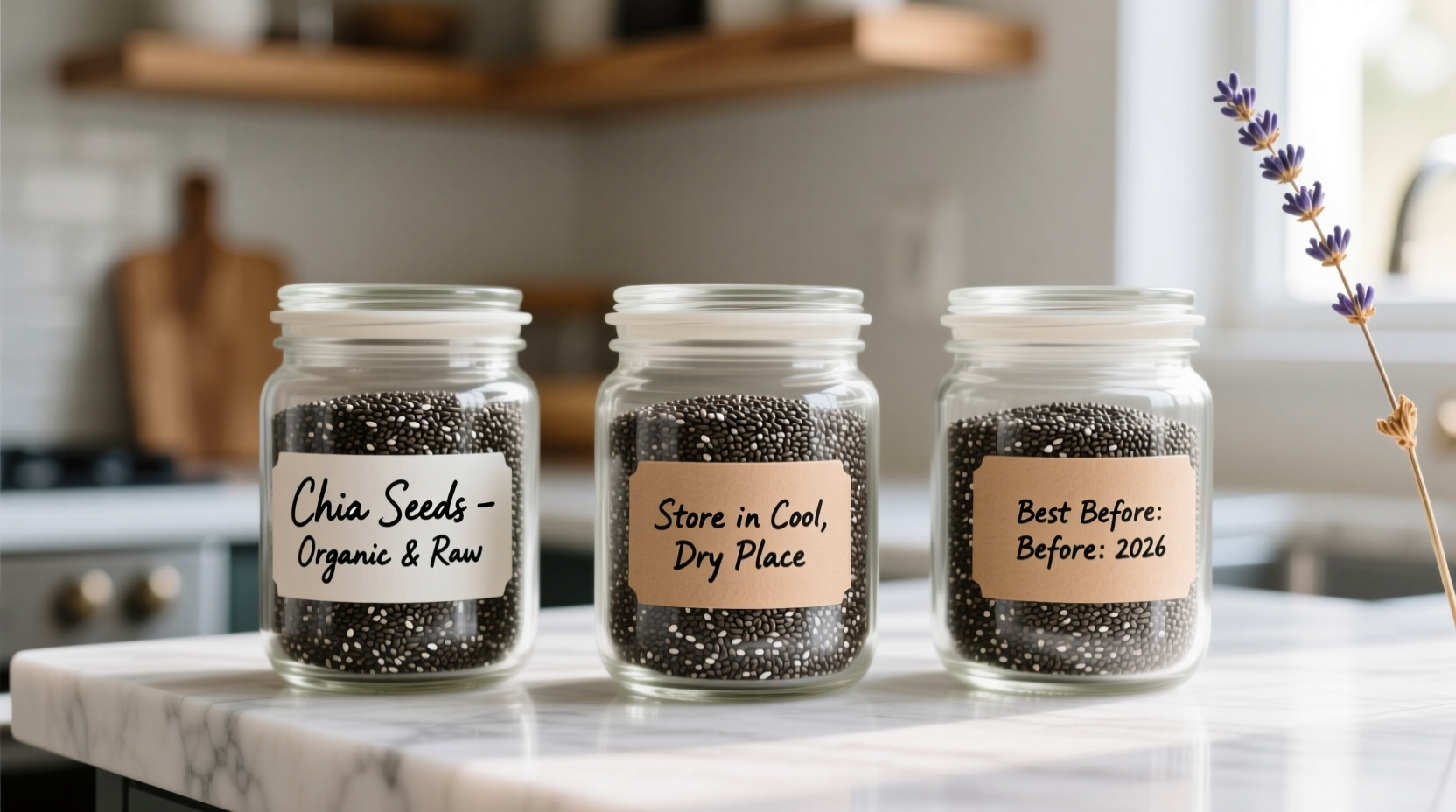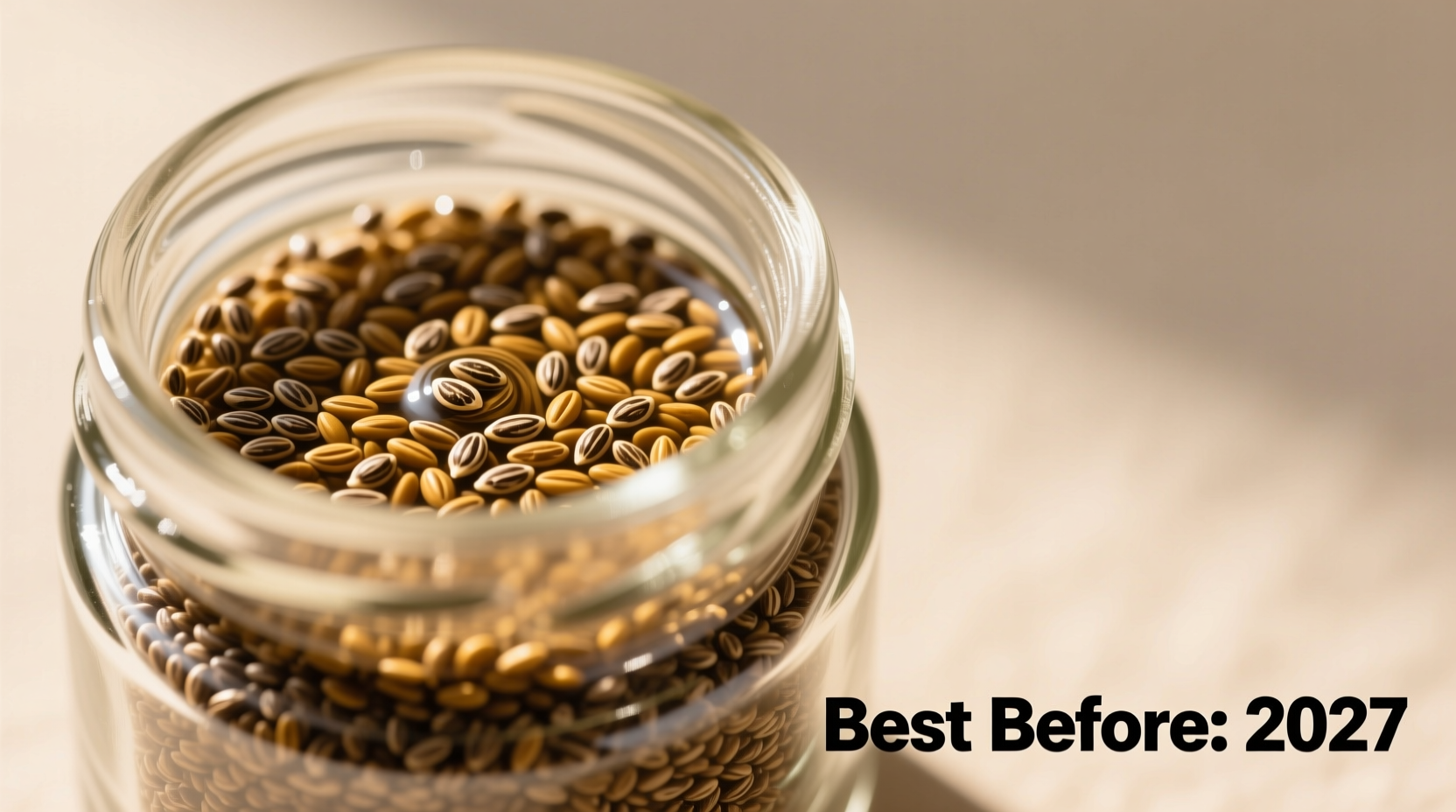Chia seeds have earned their superfood status with impressive nutritional benefits, but their longevity depends entirely on proper storage. Understanding how long are chia seeds good for prevents waste and ensures you're getting maximum nutritional value from this versatile ingredient. Let's examine the precise timelines and conditions that determine chia seed shelf life.
Chia Seed Shelf Life: The Complete Timeline
Unlike many pantry staples, chia seeds have exceptional longevity when stored correctly. Their high antioxidant content naturally preserves the delicate omega-3 fatty acids that make them nutritionally valuable. Here's what scientific research and food safety experts confirm about chia seed shelf life:
| Storage Method | Unopened Shelf Life | Opened Shelf Life | Key Preservation Factors |
|---|---|---|---|
| Pantry (Room Temperature) | 2-4 years | 6-12 months | Airtight container, away from light and heat sources |
| Refrigerator | 3-5 years | 12-18 months | Vacuum-sealed or oxygen absorbers recommended |
| Freezer | 4-6 years | 18-24 months | Moisture-proof packaging essential |
This data aligns with recommendations from the USDA National Agricultural Library, which confirms that properly stored seeds maintain quality significantly longer than most pantry items due to their natural protective compounds.
Why Chia Seeds Last Longer Than Other Seeds
Chia seeds contain high levels of natural antioxidants, particularly chlorogenic acid and caffeic acid, which protect the omega-3 fatty acids from oxidation. According to research published in the Journal of Food Science, these compounds create a protective barrier that slows rancidity development. This natural preservation mechanism explains why how long chia seeds last after opening exceeds most other seeds by 3-6 months when stored identically.

Storage Methods That Maximize Shelf Life
Your storage technique dramatically impacts how long are chia seeds good for after purchase. Follow these science-backed methods:
Unopened Package Storage
Keep unopened chia seeds in their original packaging in a cool, dark pantry. The opaque packaging protects against light exposure, which accelerates oxidation. For extended storage beyond two years, transfer to a vacuum-sealed container with oxygen absorbers.
Opened Package Storage
Once opened, immediately transfer chia seeds to an airtight glass or BPA-free plastic container. For optimal results when determining how long do chia seeds last after opening, follow this protocol:
- Wipe container interior dry with a clean cloth before transferring seeds
- Fill container to at least 80% capacity to minimize air exposure
- Add a food-safe oxygen absorber packet
- Store in refrigerator for 50% longer shelf life than pantry storage
Spoilage Indicators: When Chia Seeds Go Bad
Knowing how long chia seeds are good for is only half the equation—you must recognize when they've spoiled. Here's the spoilage timeline based on USDA food safety guidelines:
0-6 Months After Opening (Pantry Storage)
Seeds maintain peak freshness with no visible changes. Nutritional analysis shows 95-100% retention of omega-3 fatty acids.
6-12 Months After Opening (Pantry Storage)
Early oxidation begins. You might detect a slightly oily aroma when crushed between fingers. Nutritional testing reveals 85-90% omega-3 retention.
12-18 Months After Opening (Pantry Storage)
Clear signs of rancidity: musty odor, slightly darker color, and bitter taste. Omega-3 content drops to 70-75% of original levels.
Immediate Discard Indicators
Discard chia seeds immediately if you notice:
- Mold growth (even small spots)
- Visible moisture or clumping
- Strong chemical or paint-like odor
- Significant color change from original batch
Freezing Chia Seeds: The Longevity Secret
For those asking how long do chia seeds last in the freezer, the answer is impressive. Properly frozen chia seeds maintain nutritional integrity for 18-24 months after opening. The National Center for Home Food Preservation confirms that freezing halts oxidation almost completely when seeds are stored in moisture-proof containers.
Freezing protocol:
- Portion seeds into 1-cup servings
- Use double-layered freezer bags with air pressed out
- Label with date and "For Smoothies" or "For Baking"
- Thaw only what you'll use within 24 hours
Common Storage Mistakes That Shorten Shelf Life
Many home cooks unknowingly reduce how long chia seeds stay fresh by making these errors:
- Leaving seeds in transparent packaging on pantry shelves
- Using wet utensils to scoop seeds
- Storing near heat sources like ovens or dishwashers
- Keeping seeds in original packaging after opening
- Mixing new and old batches of seeds
Each mistake can reduce chia seed shelf life by 30-50%, turning a potential 12-month pantry storage into just 6 months of quality.
Maximizing Nutritional Value Through Proper Storage
The shelf life question "how long are chia seeds good for" isn't just about safety—it's about preserving their remarkable nutritional profile. Research from the National Institutes of Health shows that proper storage maintains:
- Omega-3 fatty acid content (critical for heart health)
- Antioxidant levels (fighting cellular damage)
- Fiber integrity (supporting digestive health)
- Protein bioavailability (essential for muscle maintenance)
When stored optimally, chia seeds retain over 90% of their nutritional value throughout their shelf life, making proper storage a health investment, not just a cost-saving measure.
Practical Storage Solutions for Every Kitchen
Whether you buy chia seeds in bulk or small quantities, these storage solutions ensure maximum freshness:
Budget-Friendly Method
Use mason jars with tight-sealing lids stored in a dark pantry cabinet. Add a silica gel packet (from dried fruit packaging) to absorb moisture. This method extends opened shelf life to 8-10 months.
Premium Preservation
Vacuum-seal portions with oxygen absorbers in glass containers. Store in refrigerator for 15-18 month freshness. Ideal for those who buy chia seeds in bulk to save money.
Emergency Preparedness
For long-term storage (3+ years), freeze chia seeds in vacuum-sealed Mylar bags with oxygen absorbers. This military-grade preservation maintains nutritional value for emergency food supplies.











 浙公网安备
33010002000092号
浙公网安备
33010002000092号 浙B2-20120091-4
浙B2-20120091-4